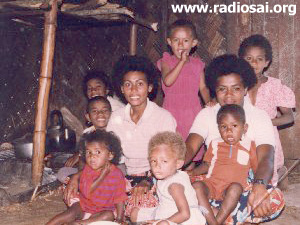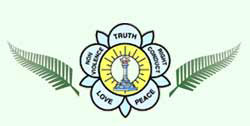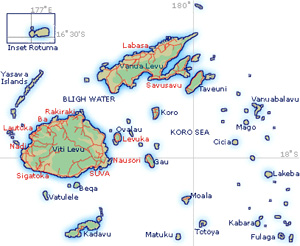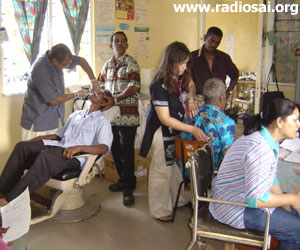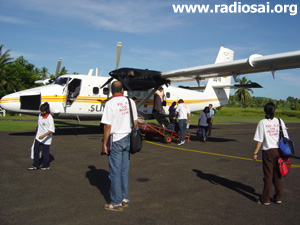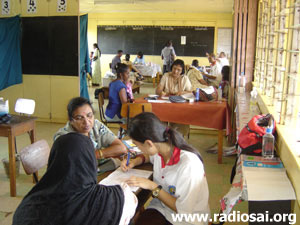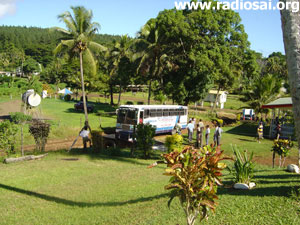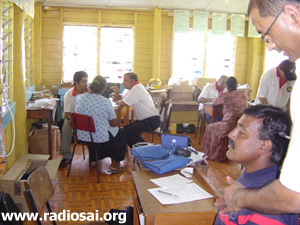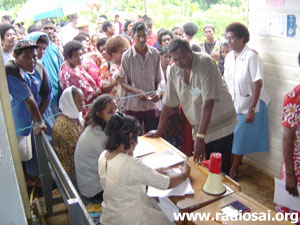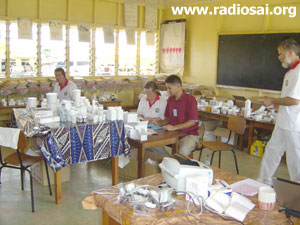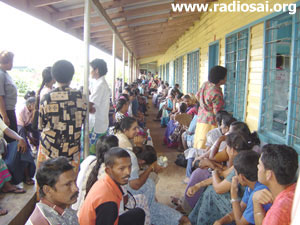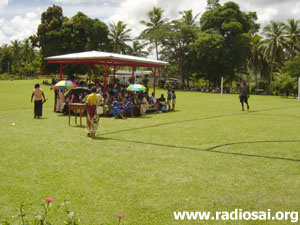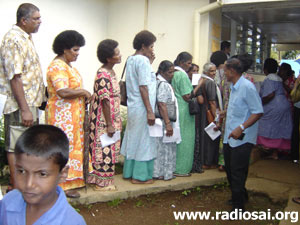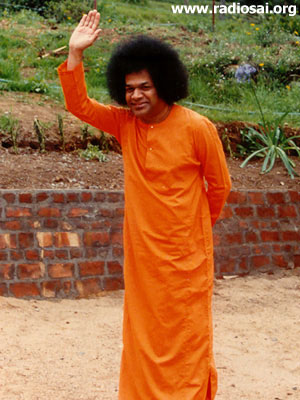MOVING SAI SEVA IN FIJI
A week of inspiring service to the needy in the Fijian islands through well planned medical camps by Sai devotees from New Zealand on the 18th to 25th of March 2006.
Welfare services should be free for all. There are numerous people who cannot afford the costs of medical treatment. Doctors should render free service to such persons.
Sathya Sai Baba – Discourse on 3/06/1995
On the 18th of March, 2006, a major service project was initiated by members of the Sathya Sai Service Organisation of New Zealand. Twenty-four devotees, made up of doctors and volunteers, took a three hour flight north to the Fiji islands to take part in five free medical camps coordinated by New Zealand and Fiji devotees working hand in hand.
A Little About Fiji …
Fiji lies in the heart of the Pacific Ocean midway between the equator and the South Pole. In the days of sailing ships it was known as the Cannibal Isles and avoided by mariners because of its fierce warriors and treacherous waters. Of Fiji's 330 islands (of which a third are inhabited), the majority of the estimated population of 840,000 lives on the largest island of Viti Levu, with about 200,000 residing on the second largest island, Vanua Levu.
Current State of Affairs
The current population breakdown is 50% Fijian, 34% of Indian descent, and the remainder from other races. Not many years ago Indians made up just over 50% of the population but since the coups many have immigrated to countries such as Australia , New Zealand and Canada. |
|
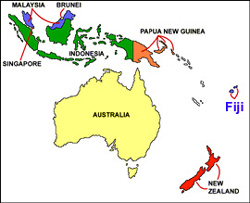 |
| |
|
The Islands of Fiji in the Pacific Ocean |
This has caused a depletion of qualified people which in turn has led to the problems encountered today in remote areas where adequate health care is not readily available.
Medical Camps For The Most Needy
|
|
The medical camps were planned to be centred on Vanua Levu, which is primarily made up of rural villages with poor infrastructure and little or no access to basic medical care. Most on this island live on subsistence plantations under difficult conditions. Moreover, the political upheavals of the last decade have exacerbated their hardships, creating a feeling of helplessness. Therefore the four medical camps were targeted to benefit those most in need. These few sad statistics tell the story:
- Life expectancy on Vanua Levu is 67 years while in New Zealand and Australia it is 80
- Maternal deaths from childbirth on Vanua Levu are 6 to 7 times higher than in New Zealand and Australia
- Infant mortality is 3 to 4 times higher than in New Zealand and Australia.
|
The people of Fiji |
|
|
Volunteers Enthusiasm And Government’s Support
The planning for the proposed camps began during the last few months of 2005 when the Medical Coordinator for the Sathya Sai Medical Unit of New Zealand spoke directly with Sai members in Fiji and using his own local knowledge of the conditions and needs proposed the venue sites. The message went out to all Sai Centres and groups throughout New Zealand and within a short while eight MDs (including a surgeon), one Homeopathic Doctor, a Pharmacist and fourteen volunteers had signed up and paid for their airfares. |
|
|
| |
|
The New Zealand Sai Organisation |
The Sai service team in Fiji began arranging the sites where the camps were to be held. As is the norm, when one has faith in Swami’s grace and compassion doors open and four of the camps were held at schools situated in the chosen area, with the fifth at a small health centre in the interior. Knowing how beneficial these camps would be for the populace in these regions, the Fijian Government’s Minister of Education gave permission for the four schools to host the camps. As well, the schools gave assurances that the Headmasters and teachers supported the program and would provide lunch and drinking water for the medical staff and volunteers. Everyone working together in unity and love to provide a much needed service to those in real need without expectation of any personal reward was a living example of Swami’s Love in Action.
Arrival, Preparation And Swami's Grace
At about 5:30 p.m. on the 18th of March, the team from New Zealand touched down at Nadi Airport on the main island of Viti Levu. They all knew that Swami was with them as the day they landed the weather changed from three solid months of heavy rain and tropical storms to clear and calm. Also, to make matters more interesting, prior to departing Auckland, the Australian, UK, and US Governments posted warnings on their websites not to travel to Fiji as there was a threat of yet another Army coup. (The New Zealand Government however did not bother to follow suit.)
| Nine cartons of drugs and medical supplies were brought, of which four were donated by pharmaceutical companies in New Zealand with no strings attached. The week prior to leaving, a volunteer travelled to Fiji and through a drug wholesaler purchased twenty more boxes of supplies.
This was made possible by the Sai community in New Zealand who opened their hearts and wallets to ensure that the team was self sufficient in the required medications.
Also, a volunteer group in Auckland (who are not Sai devotees) gave three cartons of used spectacles which they had sterilized, sorted, graded and packed for the trip. These proved immensely valuable, especially in the outer areas where most of the patients who needed them had no way to pay for what was to them a luxury.
| |
|
| |
|
The principal islands of Fiji - Viti Levu and Vanua Levu |
At the check in counter at Auckland Airport, God smiled on the group again. Though most were travelling light, due to the cartons of medicines they were still overweight on their luggage allowance. However, without question, the Airline immediately gave a full dispensation. There is no such thing as ‘coincidence’ where God is involved.
After being picked up from Nadi Airport by Fiji devotees, a short briefing session was held at the Sai Centre in Lautoka – a twenty minute drive from the airport – followed by devotional singing and a meal lovingly prepared by the local Sai members. The first camp was scheduled for the following day (Sunday) at the Sai School in the Drasa area near Lautoka at 8:00 a.m., so everyone dispersed to their host's homes for a good night’s sleep.
GETTING TO WORK: FIRST MEDICAL CAMP IN SAI SCHOOL, DRASA
“If They Can Sacrifice Their Time…I Can Give Up Just One Day” – A Local Doctor
|
|
Sunday morning dawned beautifully and a hired bus drove the New Zealand group to the camp accompanied by Sai devotees from the Lautoka area. They arrivied at the Sai school venue at about 7:30 a.m., where to everyone’s surprise, people were already queuing up to register to see a doctor.
The team was joined by six doctors from the hospital in Lautoka, a dental unit from the same area, and an optometrist who were not Sai devotees but heard about the camp and wanted to help. As one local doctor said:
I heard that a fairly large group was coming from New Zealand to hold a medical camp here and I thought that if they can sacrifice their time and effort to spend a week in the Fiji islands then surely I can give up just one of my days off.
|
The doctors from New Zealand at work... |
|
|
This camp was to be a learning curve for the team as most had not taken part in such a large group venture like this before, and some felt a bit apprehensive as to how the day might go. However, it proved to be a great success. People came from surrounding villages, both Fijian and Indian together, and the wonderful team of local helpers ensured that patients did not have to wait too long and prescriptions were filled quickly. It was clear but hot and humid and at about 3:00 p.m. God smiled yet again and opened the heavens and delightful cooling rains fell. Immediately the high heat dropped a bit and everyone felt refreshed.
Holding the medical camp at a school proved an excellent idea as the doctors could use classrooms for consultations while others were available for the dental unit and pharmacy, and so on.
“It Was Incredible…All Worked So Wonderfully” – A Local Camp Coordinator
The last patient was treated at 6:00 p.m. and in total just over 530 people had been seen, prescriptions issued where needed, and referrals to the hospital in Lautoka made for more serious cases. The New Zealand team and local doctors and volunteers worked extremely well together and all felt that Swami had been with them throughout the day.
|
|
By 6 pm over 530 patients had been examined in the first medical camp at the Sai School in Drasa. |
|
It was incredible! No one knew who the doctors and volunteers from New Zealand were until the first meeting that morning at the camp, but everyone worked so wonderfully well together, joined together in unity and Swami’s love that it is impossible to try and explain. The local villagers came on Saturday and put up sun shelters and also helped set up the outside kitchen as the decision was made to feed all who attended – patients and the medical team. At the end, all went away very happy – both the patients and the team of doctors and volunteers. I thank Swami for His grace and love He showered upon us throughout the day.
- Camp Coordinator From Lautoka Sai Centre
The New Zealanders joined the local devotees at the Lautoka Sai Centre that night for a light meal, devotional singing and debriefing. All agreed that although they were tired, it had been an exercise in unity and love and a definite need had been filled.
MEDICAL CAMP NUMBER TWO AT ISLAND VANUA LEVU
Adversity Becomes An Opportunity
Monday, March 20th, was again clear and dry as the New Zealand group arrived at Nadi Airport for a 7:00 a.m. flight to Vanua Levu . This time they would be accompanied by only three devotees from the main island – one GP from Suva, one pharmacist from Lautoka, and a dentist from Suva. These three had committed themselves to stay with the team for the next four medical camps. An optometrist nurse joined up in Labasa and accompanied them to each camp held there.
The original plan was to travel by bus, ferry, then bus again – driving across the island of Viti Levu for three hours – then board the ferry for a three hour crossing, then another bus for four hours before reaching Labassa, the main town on Vanual Levu where they would have accommodations at a motel.
It was not meant to be, however, as prior to leaving New Zealand they learned that recent heavy rains had washed out some of the main roads from the ferry port to Labasa.
So decisions were made to fly into Labasa via the local tourist airline. Again this was no accident, since only needing one hour instead of ten for travel enabled an additional medical camp to be held. | |
|
| |
|
The team lands at Labasa... |
How Swami Came To The Rescue Yet Again
The two planes were small twin engine aircraft. One carried twenty members of the team and the other took the rest and departed a half an hour later. Since the aircraft were small, each person was weighed with their carryon bags and allowed only 15kgs total luggage weight. As the team had picked up most of the cartons of pharmaceuticals on their way to the airport, this announcement caused some concern, but once again Swami was there. Suddenly a devotee from the Lautoka Centre appeared who noticed the amount of cartons needed to be taken and who just happened to work for the Fijian Airport Aviation authorities. Within ten minutes all the personal bags and the cartons of drugs were loaded and boarding passes issued. Silent prayers of thanks were offered to Swami as the aircraft were boarded and the pilots prepared to take off.
The flight to Labasa Airport was just over an hour and flying at 8000 feet ensured an excellent view of the coral reefs and atolls passing by below. They touched down just after 8:00 a.m. and after a half hour the second plane arrived with the rest of the group. A bus had been arranged to ferry the team around for the rest of the week and after being advised by the airline’s representative that the baggage and cartons of medical supplies would arrive at 11:00 a.m. on a special flight, the team headed directly to the medical camp site. A few members returned with the bus to the airport to collect the supplies.
Mutual Love, Compassion And Gratitude
|
|
This camp was at a school in Waiqele, thirty minutes from the airport, and would tend to the needs of those in the area and from Labasa. Many people were already waiting to register, so the team quickly set up the rooms so registrations and consultation could begin. They were ably assisted by local Sai volunteers who stayed with the New Zealand team throughout the week and proved themselves invaluable.
The one small glitch at this second camp was the distribution of prescriptions as the supplies did not reach the camp until 11:30 a.m., but after an initial busy period, things settled down and the team got into the swing of things. The staff and management of the schools were all extremely helpful and most worked right to the end. The schoolchildren were also very cooperative, making room for us by doubling up into classrooms as they had not been given a day off.
|
It was non-stop service from dawn to dusk... |
|
|
Local villagers supplied lunch to all who came and the bond of unity and love between everyone was incredible. There was the occasional sadness when the team found individuals with serious medical conditions only an impossibly expensive operation at some faraway First World hospital could fix, but the basic feeling was one of love and compassion for the patients and gratitude and happiness shown by the villagers as they waited to be seen. |
|
550 patients were treated and over 800 prescriptions filled on day one of the second Medical Camp in Waiquele, on the Fijian Island of Vanua Levu. |
|
The last patient was seen just after 6:00 p.m. and by the time everything was packed up and loaded onto the bus it was nearly 7:00. On this day alone over 550 patients were treated and well over 800 prescriptions filled.
Endearing Love of Local Sai Devotees
The local Sai devotees are small in number but not in spirit and had asked to host the New Zealand team for their nightly meal which was held at a different venue each evening in Labasa. The team unanimously agreed to go to the host’s houses directly from the camps instead of first returning to their accommodation, and this was the routine for the rest of the week. They would travel to where they were going to be hosted, be formally greeted, and after a brief wash up the New Zealand team would sing bhajans for thirty minutes before eating. They always made an effort to sing English devotional songs with some Maori songs included as well, and this made the local Sai hosts happy.
No matter how tired the team felt at the end of the day's seva, once they began singing to Lord Sai all feelings of weariness disappeared. It was clearly noticeable that these sessions were of vital importance and helped make the ending of each day just perfect.
MEDICAL CAMP NUMBER THREE IN LEKUTU VILLAGE
Tuesday morning the 21st of March the team arose at 4:30 a.m. as the bus was picking them up at 5:30 for a three and a half journey into the hinterlands. This camp was held in Lekutu village at a small medical centre staffed by a sole senior nurse from the hospital in Labasa. This centre treated people from villages within a 200km radius and was hopelessly under funded but always tried to do the best they could with the minuscule resources they were allotted.
Poor, Yet Smiling
The bus trip was long but seemed to go faster when bhajans were sung on the way and a stop was made for a quick onboard breakfast. The first part of the journey was on fairly good tar sealed roads but the last hour and a half they were rough gravel and stone and pitted with pot holes. On the way they saw people living in extreme poverty – small tin sheds as family homes and gardens cultivated on tiny plots of land. But it was noticed that the children who were walking to school were all tidy in clean clothes and seemed happy, greeting us with lovely smiles as we passed by. Some of these children walk two hours each way to school! The poverty affected both Fijian and Indian families though in this region most of the patients that attended the camp were native Fijians. The weather was extremely hot and humid and team members had to drink a lot of water to keep from dehydrating. |
|
|
| |
|
The bus could go no further in Lekutu Village |
Challenges and Grace
The facilities were extremely small and it was amazing how everyone managed to fit into the three tiny buildings that were available. The pharmacy shared a room with two consulting doctors and just how the pharmacy team managed to locate the prescribed medicines was something of a miracle in itself. The pharmacist from New Zealand had his laptop and label machine set up at the end of a rickety old bed and stood the whole day with only a ten minute break for lunch. This was the norm for all the doctors and volunteers. The pharmacist from Lautoka carefully checked each prescription once it had been labelled before handing it out. Luckily power was available as the prescription label machine made such a difference in the process. The team found out later that the current to this centre had been down for several days but was mysteriously reinstated a short time before the camp started. The power source there was solar.
“I Am So Glad I Have Come…” – A Doctor From New Zealand
An important decision had been made by the team before any of the camps started that no matter how late they had to work, all would be seen and no one would be turned away.
|
|
I had reservations when I was first contacted last year in regards to coming to Fiji to take part in these medical camps as I had never been part of something like this. I am so glad that I have come and have been a part of this wonderful group of people. Every one of the group of doctors and volunteers from New Zealand are working so incredibly well together and it is as if they have been together like this for ever. We all can feel Swami’s Divine presence and know it would not have been possible without His input. I never realised how hard it is for people in a country so close to ours to have such difficulties in accessing good health care. I feel very humble and know that if I am invited to attend the next venture in Fiji then I will not hesitate to put my hand up.
|
I was an incredible experience for the doctors.. |
|
– A doctor from New Zealand
|
“We Pray That You Come Again Next Year” – A Village Elder in Lekutu
The people attending this camp were so grateful that the team had made the effort to come into such a remote area. They told our doctors some had come from 80 to 100km away while others journeyed on horseback. They also explained that what made the difference was that the doctors listened to them, treated them with love and respect and touched them. In some cases they felt cured by just having spoken to one of the doctors and being heard. Others said that they could never afford to go to Labasa for medicines and felt that God had helped them.
At this camp, the dentist from Suva carried out over 60 extractions in one day and explained that this was the only possible treatment as these unfortunate people could not afford to travel to Labasa or have dental work done. Some of them had been suffering from decaying teeth for a long time and their relief was plainly seen by all.
We are so happy that the team from New Zealand have come. We heard some time back that you were coming here and the word spread like wildfire. Your time with us today will give us all an everlasting memory and we pray that you will come back next year. If you do so, we will look after all of you in our village. Thanks to you all for your care and love. May God be with you always.
– A Fijian Elder from local village at Lekutu Medical Camp
|
|
|
| |
|
Registrations going on in the Lekutu Camp... |
Worn-out But Happy And Humbled
This camp finished at 6:00 p.m. and none of the Fijian people left the area until the team packed up. Then they insisted that every team member be presented with a fresh coconut to drink at a special ceremony, which was touching. Once again there was a lot of love and humour, but also an incredible sense of unity as everyone worked together in the humid and cramped conditions. Most of the donated spectacles were given out here as the optometrist found many villagers had been suffering from bad eyesight for years. Those people in New Zealand who made this possible with their donation of eyeglasses should be pleased to know their contribution helped a great many people. 610 patients were seen and over 900 prescriptions given out. It was an exhausting but rewarding day for all who took part.
The long bus ride back to Labasa was tiring but once the group had their evening meal and sang some bhajans, their weariness disappeared. Oh how God loves it when His devotees sing to Him with love and reverence even after a fatiguing day. It was after midnight when the team finally got to bed, worn-out but happy and humbled by what they had seen and experienced. |
|
In the Second Medical Camp in Lekutu Village, 610 patients were seen and more than 900 prescriptions were given out. |
|
THE FOURTH MEDICAL CAMP AT SEAQAQA VILLAGE
On Wednesday the 22nd of March, the team was up bright and early to travel to the next site at a school in the village of Seaqaqa ninety minutes away. The team arrived at 7:00 a.m. and set up the rooms that had been allocated and again found there were people already queuing up to register and another busy day was on the way.
“You Bring With You God’s Love…” – Headmaster of Seaqaqa School
This area had an equal amount of Fijian and Indian patients and a concerted effort was made to treat the elderly, the seriously ill and very young first. The volunteers involved in registrations were extremely grateful when some men from the local village offered to help with crowd control as this certainly made a difference in the number of people seen.
The Headmaster of the school, a local Fijian man, made an impassioned speech later in the day on the difference the team from New Zealand and those from Labasa were making.
We are extremely happy that you have come here to help our people. All of you have come from a long way away, yet we feel that we have known you for ever. Surely God has sent you and you bring with you His love. You have come here without any expectations yet you are willing to work long hours as part of your philosophy. Please come back again, we will always host you when you do so
– Headmaster, Seaqaqa School
|
|
|
| |
|
The makeshift pharmacy at the Seaqaqa Camp |
A Fulfilling Experience
The people waited in good humour and in harmony with each other. Most families who attended had brought their own lunch and made a day of it but there were some who needed feeding and this was provided by the staff of the school.
Over 650 patients were examined and 900 prescriptions given out at the Fourth Medical Camp in Seaqaqa Village |
|
|
Though the day was extremely busy for everyone and did not finish until 7:00 p.m., it was a rewarding experience for all who were part of it. Well over 650 patients were seen and the prescription count topped 900. All were seen and some with serious problems were referred to Labasa hospital for special appointments. That night the bhajans were very sweet and sung with much devotion and love. No one felt weary, just happy and grateful to Swami for making this special project possible. |
THE FIFTH AND FINAL MEDICAL CAMP AT NALEBA SCHOOL
|
|
Thursday the 23rd of March was the day of the final camp, held at Naleba School , about forty-five minutes from Labasa. Though the school grounds were beautiful, this region is very poor and the people struggle to survive.
Much of this poverty is the result of the coups over the past fifteen years as Indian sugar cane farmers have had to surrender leases on the land leaving them virtually with nothing.
Once again the team began early and arrived at the school at 7:00 a.m. to find people already queuing up for registration. The school Headmaster and his staff were extremely helpful and kept the situation under control and allowed some of the senior children to help out. |
At the camp at Naleba School |
|
|
The Busiest And Most Blessed Day
By midday people were growing anxious they might not be seen due to the large crowds pouring in but the team reassured everyone they would treat all who registered and people settled down under shady trees and awnings that had been erected to await their turn. The problem of registrations was solved by giving everyone a number and using a loud hailer to announce these numbers as the doctors were freed up. This worked very well and allowed people to spread out under trees throughout the grounds and not worry about being missed. |
|
By the end of the day in the Fifth Medical Camp in Naleba School, a total of 760 patients were seen and 1200 prescriptions filled and dispensed. |
|
|
|
This day turned out to be the busiest of all. The last patient was seen at 8:00 p.m. and by the time the final prescription was handed out it was 9:00. By the end of the day a total of 760 patients were seen and 1200 prescriptions filled and dispensed.
Before leaving, eight cartons of medicines were donated to the medical centre at Lekutu so the nurse there could administer medications prescribed to certain patients for many months to come.
Local health authorities gave assurances that prescriptions would be supplied for as long as the patients needed them.
|
People waiting to be seen at the Nabela Camp |
|
|
“The Touching Love Of Doctors Helped Many People Over Their Ailments” – A Local Sai Volunteer
One of the volunteers from Labasa, a Sai lady devotee who came to help for this one day, explained through an interpreter:
I am a kindergarten teacher and I prayed to Baba that I wanted to help the New Zealanders and do some service at the last camp. Baba answered my prayers and I was allowed to close the kindergarten early and go to the school to help. We heard that the doctors and other people there were doing wonderful work and in such a loving way. People were saying to me that these doctors from New Zealand were talking to each patient, listening to each one, helping them and touching them with love. And it was this touching that helped many people over their ailments. I could feel Baba’s presence there so strongly and was so happy that He allowed me to help them. We have good doctors in Labasa hospital as well but they are always so busy that they probably do not have the time to spend with each patient as these people do. Everyone here has been so happy that the New Zealand people have come and wish that they can come more often. If they do so then I want to help again .
|
|
|
| |
|
People queuing up till late afternoon |
The team left the school at 9:30 p.m. to travel a short distance to another Sai devotee’s place for their evening meal. Once again, singing bhajans before partaking of the food revived them. All experienced an inner joy and peace as they knew that these camps would never have been so successful without Swami overseeing everything in His quiet and loving way.
Heading Home And Final Thoughts
“The Whole Exercise Was Possible Because Of Sai’s Grace” – A Team Member
I doubt very much if any other group of people who had never worked together before under such trying conditions would have completed these medical camps without serious internal problems or disharmony. I have never worked before with people who just seemed to be made for each job they took on. The unity and the love between all who were here was just incredible and no one showed dissent or argued against any joint decisions that were made at different times. The whole exercise was only made possible because of Swami’s grace and love for us and because of our love for Him and our determination to try and be examples of His teachings.
– A Team Member
The New Zealand group flew back to the main island on Friday morning with well over 3000 patients being seen over the five days of camps. They all felt extremely blessed to have been part of the project but also humbled at what they had seen and experienced. |
|
Over 3000 patients were examined over five days of camps in remote and rural areas of Fiji. |
|
One can only hope that devotees in other First World nations will look beyond their own comfort zones and see the opportunities for seva that abound in nearby countries.
Fiji is in New Zealand ’s backyard – a mere three hour flight away – but the difference in available health care is huge. For instance, in Fiji , whether out in the hinterlands or close to a main town, a person suffering a heart attack has no chance for an operation as there is nothing in the way of heart surgical wards or specialists available. Only those with enough money for flights to New Zealand or Australia and heart surgery and post operative care might survive. But such huge costs are beyond the means of almost all, especially those in the villages struggling to make ends meet.
The Sai-Inspired Guidelines That Ensured Success
A few important points that should be noted are:
- The team chose to be self sufficient in pharmaceuticals and not have to rely on any one else so all medical needs were ordered and paid for prior to the camps starting.
-
The team paid for all their own airfares, both international flights and the internal Fijian flights and all accommodations as well. Even though they did not want to be a burden on the Sai devotees in Labasa and were happy to have arranged their own meals on returning to base each day, these evening satsangs with the local people proved to be extremely beneficial for all and an important aspect of the whole venture.
-
Each morning before commencing the camps, prayers were offered to Swami asking Him for His love and guidance throughout the day ahead.
-
At a planning session it was decided the camps should be continuous with no days taken off between them so the energy and commitment would not abate as the priority was in helping those less fortunate than themselves. Everyone afterwards felt that this was the correct way to do it.
-
Even though the Sai community in Labasa offered to accommodate the team over the four nights they were there, it was agreed it would be best if the group stayed together in the motel accommodation. They felt if any one of them needed help or support then the entire team was available to respond as a unit…or like a family.
- The team members felt that they had been the main beneficiaries of this service project.
|
|
|
All the doctors and volunteers from New Zealand and Sai volunteers from Fiji could sense Swami’s presence throughout the whole exercise. Small miracles kept happening that could not be explained as coincidences and it was He who ensured there were no serious hiccups or insurmountable problems. Swami's love and compassion touched each and every patient through the care that the doctors and volunteers allowed to flow through them.
– Heart2Heart Team





